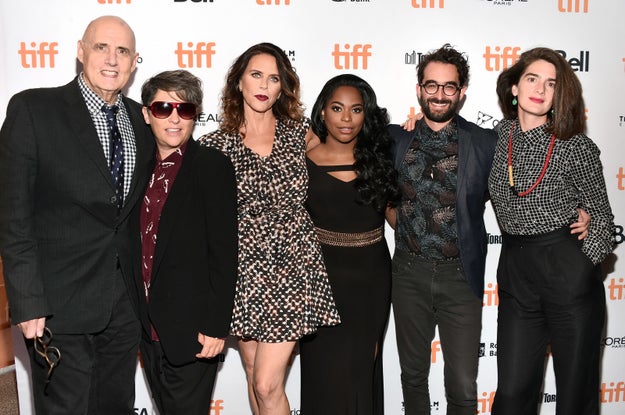
Transparent’s Jeffrey Tambor, creator/writer Jill Soloway, Amy Landecker, Alexandra Grey, Jay Duplass and Gaby Hoffmann attend the “Transparent” Season 3 premiere during the 2016 Toronto International Film Festival at The Elgin on September 11, 2016 in Toronto. Alberto E. Rodriguez / Getty Images
Jill Soloway and her Transparent cast were on hand to present the first three episodes of the show’s new season at the Toronto International Film Festival; and like those episodes, the show creator promised the fest audience that Season 3 would address issues of racial oppression and white privilege.
At the premiere’s audience Q&A, BuzzFeed News asked Soloway what her desires were in addressing issues of race in the dramedy’s newest run. “The first episode is a real tightrope walk for us as creators. It’s something I think that is a plot and story conversation about where I feel feminism is right now,” Soloway responded.
Shy of spoiling Transparent’s premiere episode — due for release on Sept. 23 — Maura Pfefferman (Jeffrey Tambor) stumbles into what Soloway called “confronting one’s own privilege” when she meets Elizah, a black trans woman (played by trans actor Alexandra Grey).
“I feel like there’s a constant evolving conversation on the internet about feminism and its relationship to intersectionality,” Soloway continued. As the Amazon Studios half-hour streaming show has introduced audiences to the Pfefferman family, the director/writer said the term “intersectionality” has come up many times over the past couple of years. Intersectionality is “the notion that there are multiple kinds of oppression. Sometimes someone might be female, or they might be a person of color, or they might be trans, they might be queer. But these multiple oppressions intersect and create different kinds of oppression.”
Soloway has been both a lightning rod and conduit for the conversation of intersectional feminism, as her show has mostly featured white, affluent Jewish lead characters, providing less room for perspective from characters of color. The series digs deeply into religious and LGBTQ identity, and has frequently put its characters’ various entitlements in check.
“We wanted to go straight at it, not avoid it,” Soloway said of making skin color a theme of this season. “That’s what we wanted to do with the first episode, is having a white [person] encounter a loss of privilege, and have that through the prism of meeting Elizah and asking these questions about intersectional relationships. Meaning, do they have something in common because they’re trans? Do they have more in common because they’re trans, or do they have less in common, maybe, because of their class or race? These are the questions that our writers room is obsessed with.”
Grey — who stood alongside series regulars Tambor, Gaby Hoffmann, Amy Landecker, Jay Duplass, and Kathryn Hahn on the Elgin Theatre stage in Toronto — said she was “overwhelmed just to be small part” of Transparent. She said it was important being a trans actor playing a trans character, and “I have a responsibility to really tell these stories.”
“I get messages every day from little trans girls and boys who say ‘I’m not going to kill myself because I see you,’” Grey said, pausing. “We’re doing something right if we’re putting this kind of program out and sharing that message.”
Soloway hinted at the symbolic combination of Elizah’s character with Jewish holy season of Passover, a holiday which serves as an umbrella to Transparent’s newest journeys. The visuals in the show’s opening title sequence has changed slightly from season to season, and Season 3’s new version splices footage of “television, spirituality, and race.”
“The Passover question of whether or not god is a woman and the Elijah-Elizah mystery is probably a spiritual, intersectional journey. I’ll stop there,” Soloway said, smiling.


